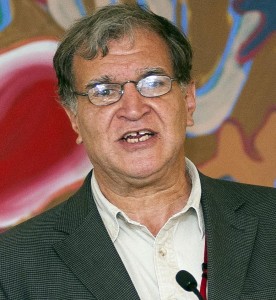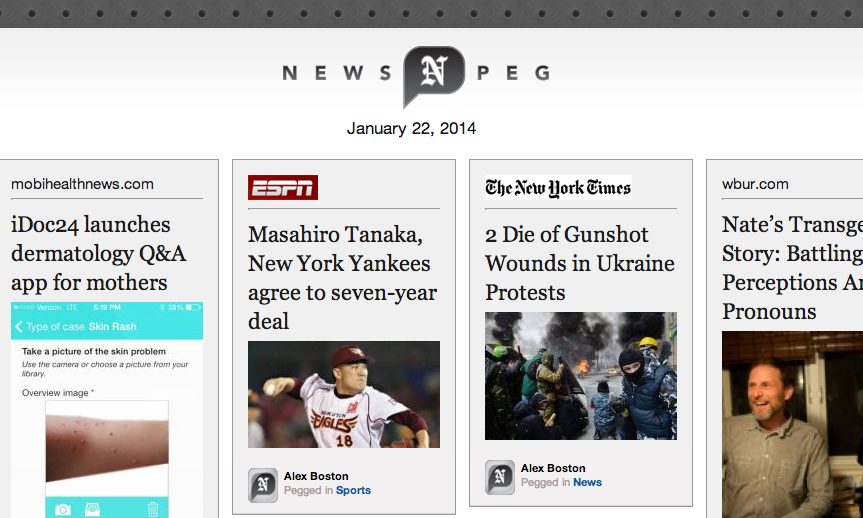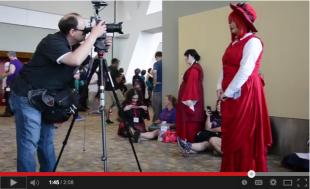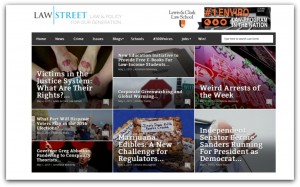When journalist and entrepreneur Mark Potts, 56, first signed up for Pinterest several years ago, he didn’t understand why it had attracted so many users.
Then a friend told him to think about how the budding social network could be valuable for news — and the concept clicked.

Mark Potts, founder of Newspeg, speaks at the 2011 Journalism Interactive conference. By Lisa Helfert.
“Put in that context, it made total sense,” Potts said. “I thought, ‘Wow, that’d be really cool: What if you took the basic Pinterest motif and used it as a way to collect news and share news?’”
He went on to develop Newspeg, a website launched this month that allows people to pin — or rather, to “peg” — articles to virtual bulletin boards in a similar fashion to the way Pinterest users collect and categorize images.
Potts said he envisions Newspeg as a platform for the average person to curate news, not solely a promotional tool for news organizations. However, he said several publications have already approached him about creating their own topic pages on the site as a way to distribute their content more widely.
News organizations have already demonstrated an interest in the type of capabilities Pinterest has to offer. More media outlets have turned to Pinterest as a storytelling tool, prompting the site to create article pins in September.
Related story: “Pinterest a Growing Option for News Outlets”
The Chicago Tribune, for instance, posts a variety of things on its Pinterest boards, including 100-year-old newspaper pages, images of events the paper holds and quotes from big stories.
The benefit of Pinterest for news consumers is the content does not fall off the page and old content can be easily rediscovered, according to an email interview with Malorie Lucich, communications manager for Pinterest, conducted with AJR.org in December.
But if news outlets are already using Pinterest to post stories, and the site allows people to post articles as “pins,” does anyone really need a standalone Pinterest for news?
Chris Krewson, digital editor of The Hollywood Reporter, said part of the appeal of Newspeg for news-related items is simple — it’s directly targeted to those in the industry.
“I love the name, frankly,” he said. ” It makes me wonder if nutgraf.com or picapole.com are coming. The idea of a news peg is something that has a good chance of breaking through the clutter because it is such an industry term.”
“That implies there’s maybe a hole in the market where a site like Newspeg could operate,” he said. “It’s an interesting effort to apply the visual aggregation model to news.”
Potts said Newspeg offers other advantages over Pinterest.
- Visibility for news brands: “We put something up and the brand is up there big and bold; if we have the logo on file, we can put the logo up…[Pinterest] is set up to highlight the photo more than anything else.”
- A more direct way to take users to the article page: “Pinterest doesn’t link back to things very well; it links to itself. We take you back to the original story.”
Potts has worked with several people on Newspeg but is bootstrapping it himself for now. He does not plan to charge users; instead, he hopes the site will be a valuable resource to understand how people look at news and said the sharing of this data, along with advertising, will make up much of his revenue.
Potts, who co-founded the Washington Post’s online division and has since worked as both an executive and a strategic consultant to media companies, believes the key to Newspeg — and Pinterest — is the human component. Humans are better than machines at evaluating and curating news, and people need good news curation systems more than ever in a world saturated with information, he said.
“Google News does a great job of pulling stuff together but about half the time, it doesn’t make any sense,” he said. “Something will happen in Washington, and they’ll run a story from Sacramento about it and you’re like, ‘Huh?’”
In contrast, people can employ Newspeg in whatever way they’d like: as a breaking news feed, as a collection tool or as a way to sift through stories without bias.
“It’s a democratic way of looking at news. Everyone’s equal so whatever people think is important becomes important,” Potts said. “It’s not more equal because it’s The New York Times or The Washington Post.”









Leave a Comment